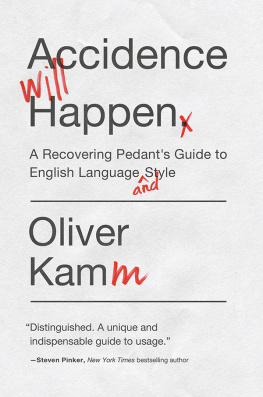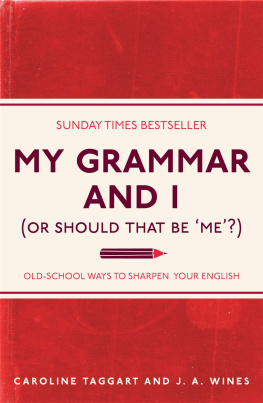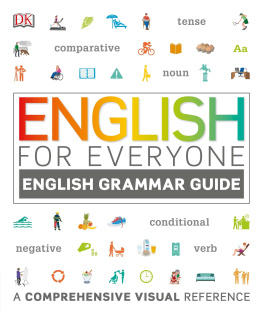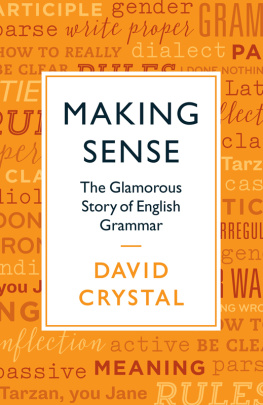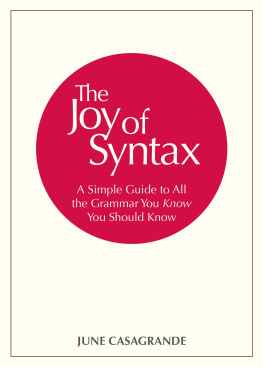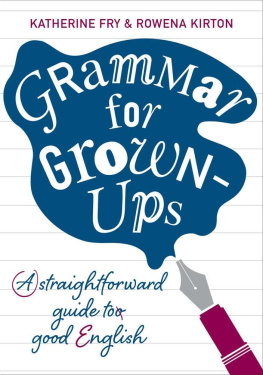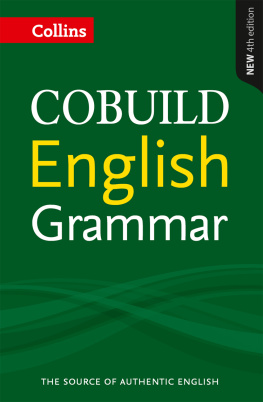Kamm - Accidence Will Happen
Here you can read online Kamm - Accidence Will Happen full text of the book (entire story) in english for free. Download pdf and epub, get meaning, cover and reviews about this ebook. City: New York, year: 2016, publisher: Pegasus Books, genre: Home and family. Description of the work, (preface) as well as reviews are available. Best literature library LitArk.com created for fans of good reading and offers a wide selection of genres:
Romance novel
Science fiction
Adventure
Detective
Science
History
Home and family
Prose
Art
Politics
Computer
Non-fiction
Religion
Business
Children
Humor
Choose a favorite category and find really read worthwhile books. Enjoy immersion in the world of imagination, feel the emotions of the characters or learn something new for yourself, make an fascinating discovery.
- Book:Accidence Will Happen
- Author:
- Publisher:Pegasus Books
- Genre:
- Year:2016
- City:New York
- Rating:4 / 5
- Favourites:Add to favourites
- Your mark:
- 80
- 1
- 2
- 3
- 4
- 5
Accidence Will Happen: summary, description and annotation
We offer to read an annotation, description, summary or preface (depends on what the author of the book "Accidence Will Happen" wrote himself). If you haven't found the necessary information about the book — write in the comments, we will try to find it.
Kamm: author's other books
Who wrote Accidence Will Happen? Find out the surname, the name of the author of the book and a list of all author's works by series.
Accidence Will Happen — read online for free the complete book (whole text) full work
Below is the text of the book, divided by pages. System saving the place of the last page read, allows you to conveniently read the book "Accidence Will Happen" online for free, without having to search again every time where you left off. Put a bookmark, and you can go to the page where you finished reading at any time.
Font size:
Interval:
Bookmark:
This book would be worse but for the advice of expert linguists in both senses of that term.
My mother, Anthea Bell, has been an inspiration to me all my life for her knowledge of languages and literature, and for much else.
Bob Borsley, professor of linguistics at Essex University, has been an invaluable and patient guide to scholarly debates about language and has saved me from many errors of fact and interpretation. Whatever mistakes remain are no fault of his.
I am fortunate to be able to expound my views on English usage regularly in The Times, and am grateful to John Witherow, Emma Tucker, James Harding, Keith Blackmore, Roger Alton, Simon Pearson and Ian Brunskill for their tolerance and support of The Pedant column over the years.
Thanks too to the many Times readers whove written to me with queries, concerns and opinions about language. They are too numerous to name individually but I should mention two in particular for their illuminating comments on grammar: Dr Lindsay Hall, whose knowledge of Classics I have ransacked in various parts of this book; and Mr N. J. Dawood, translator of the Koran and works of Arabic literature into English.
Bea Hemming at Weidenfeld & Nicolson, ably assisted by Holly Harley, provided staunch encouragement and wise editorial advice in writing this book. Whenever I was minded not to heed their suggestions, I belatedly realised I was wrong. My agent, Will Francis of Janklow & Nesbit, was a believer and ally in the project from the outset. Tom Freeman (http://stroppyeditor.wordpress.com) made penetrating comments on an early draft. I have learnt much from the writings of Professor Steven Pinker and Professor James Shapiro, and am honoured to have their endorsements for this book.
Im fortunate in the support of family, friends and colleagues including David Aaronovitch, Katherine Arora, Andrew Bailey, Gerard Baker, Martin Bell, Melissa Bell, Sharon Bell, Jessica Carsen, Tom Chivers, Michelle Chivunga, Professor Patricia Clavin, Nick Cohen, Philip Collins, Robert Crampton, Daniel Finkelstein, Jonathan Freedland, Laura Freeman, Myrto Gelati, the late Norman Geras, Francesca Gonshaw, Professor Colleen Graffy, Nigel Hankin, Gina Higgins, the late Christopher Hitchens, Sir Simon Jenkins, Alexandra Kamm, Eileen Kamm, Eleanor Kamm, Richard Kamm, Hannah Kaye, Philippe Legrain, Anna Mandoki, Beth McCann, Sarah McMahon, Robbie Millen, Alex OConnell, Peter Oppenheimer, Agnes Poirier, Stephen Pollard, Colin Proudman, Sylvia Proudman, John Rentoul, Hugo Rifkind, Alice Thomson, Francis Wheen, Giles Whittell and Arani Yoga-deva. I owe a particular debt to Dr Jeremy Nathan, Dr Annemarie OConnor and Lord (Dennis) Stevenson.
In considering the use of grammar as a corrective of what are called ungrammatical expressions, it must be borne in mind that the rules of grammar have no value except as statements of facts: whatever is in general use in a language is for that reason grammatically correct.
Henry Sweet, New English Grammar, Vol. 1, 1892, p. 5
Principles of English usage
Language is distinctively human. It differentiates us from every other species. All human societies have language, in immense grammatical complexity. The ability to speak language emerges in very young children, who can form words and combine them into sentences according to complex rules. Language ensures that societies can replicate ideas and inventions rather than have to create or discover them anew in every generation.
This book is about one language, English, and one form of it, Standard English. And it discusses just one aspect of Standard English, namely the way its used in the modern world.
Many books of advice on usage exist. The typical style manual makes judgments on what is proper English usage and what isnt. I argue instead that many of the purported rules of English grammar should be ignored. Those rules (more accurately, superstitions or shibboleths) are really just stylistic preferences. They should be considered on their merits, which are more commonly demerits. There is no literate purpose in avoiding prepositions at the end of sentences or insisting that between can apply to only two things rather than three or more. Sticking to pointless stipulations in the mistaken belief that theyre grammatically required clogs up prose and makes it sound stilted.
Nor is that the only problem with traditionalist books on usage. Worse, they miss what is really interesting about language: that its always in flux but never loses its structure. Constant invention is intrinsic to the use of language, yet the requirement that the speaker or writer be understood imposes constraints. Usage is always changing, and grammar can change too, yet it remains consistently bound by a set of rules.
Those rules arent the ones that pedants fuss about, such as whether its permissible to use the adverb hopefully to modify an entire sentence (as most native speakers in Britain and North America habitually do, and as you assuredly can), or begin a sentence with because (you can), or use they as a singular as well as a plural pronoun (again, you can). Theyre ones that ensure that subjects, objects, verbs, adjectives, adverbs and other parts of speech conform to a certain structure. We learn these rules as children. An instinct for language allows a child to acquire an appropriate set of rules and then apply them.
This book has three main arguments. First, you are already a master of grammar. Trust me on this. You became one when, as a young child, you acquired a set of rules whether of Standard English, or another variety of English, or another language. Second, theres no cause for alarm about the state of the English language, which is in excellent health and can look after itself. Third, if you use English, its useful to know the conventions of Standard English.
These premises seem to me unspectacular, even obvious. Yet public debate over language typically ignores the first, denies the second and misrepresents the third. Lets examine them in reverse order.
Conventions are convenient
The reasons for adopting a particular convention are not logic and consistency, for language operates by its own rules. The reasons are instead convenience, concision and fluency.
Its helpful to know the conventions of usage as you make your way in life, education, work and leisure. They put you on the same level as everyone else in being listened to. Adopting conventions of usage may not guarantee a hearing for your own voice with any audience but at least you wont be instantly dismissed for some perceived solecism. Everyones language offends someone sometimes and there is no shortage of (incompatible) advice on what is proper usage. In this book, I describe conventions that currently exist, while stressing that conventions shift and may be supplanted by others. The death of a convention isnt a sign of decline, only of change.
The beginning of wisdom in English usage is to realise that there are many right ways of saying things. Imagine the position of a schoolchild who uses a FLAT ADVERB (that is, an adverb that takes the same form as its related adjective, such as quick or wrong) and gets penalised for it on the grounds that an adverb should end with -ly.
It happens. Ive come across it. Faced with a sentence like I flew direct to New York, many adults (including some English teachers) will instinctively correct direct to directly, not realising that this adverbial use of direct is Standard English. What will happen if children get marked down for using this type of completely legitimate construction in an essay? Theyll be deterred ever after from writing something thats fluent and idiomatic, and perhaps in later life theyll misguidedly correct others who do the same.
Next pageFont size:
Interval:
Bookmark:
Similar books «Accidence Will Happen»
Look at similar books to Accidence Will Happen. We have selected literature similar in name and meaning in the hope of providing readers with more options to find new, interesting, not yet read works.
Discussion, reviews of the book Accidence Will Happen and just readers' own opinions. Leave your comments, write what you think about the work, its meaning or the main characters. Specify what exactly you liked and what you didn't like, and why you think so.

